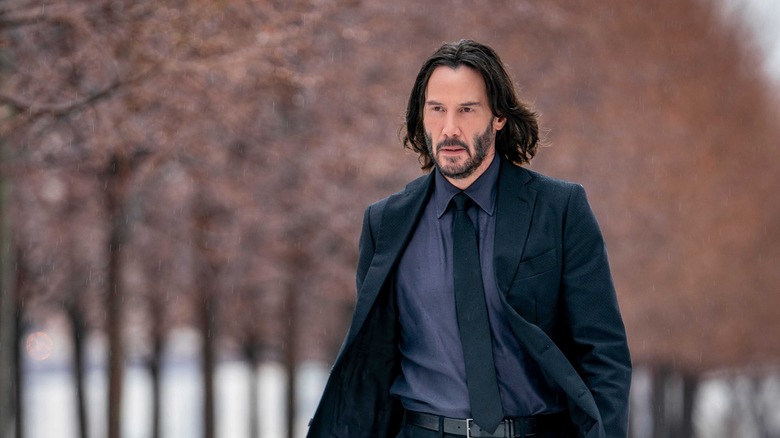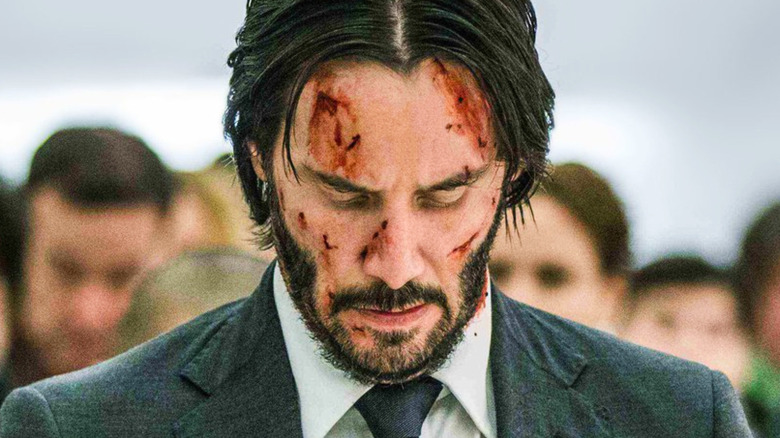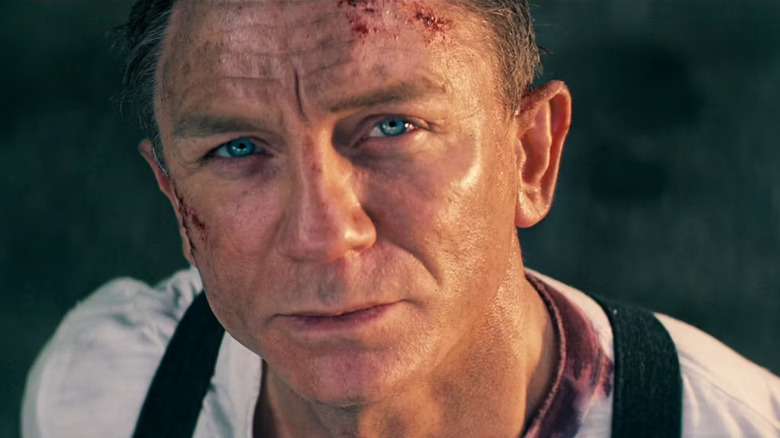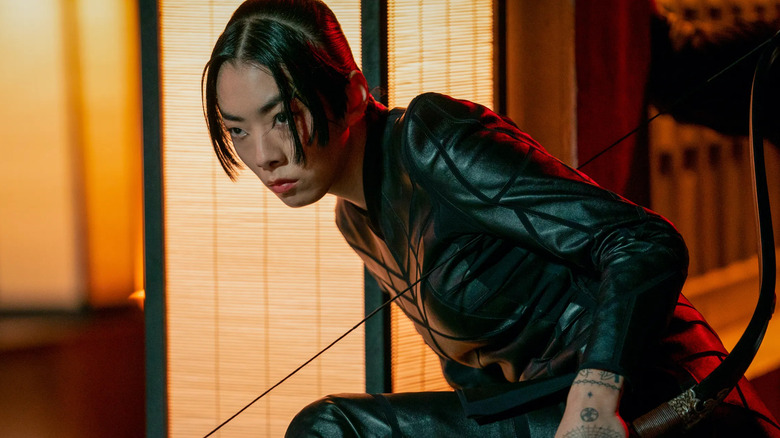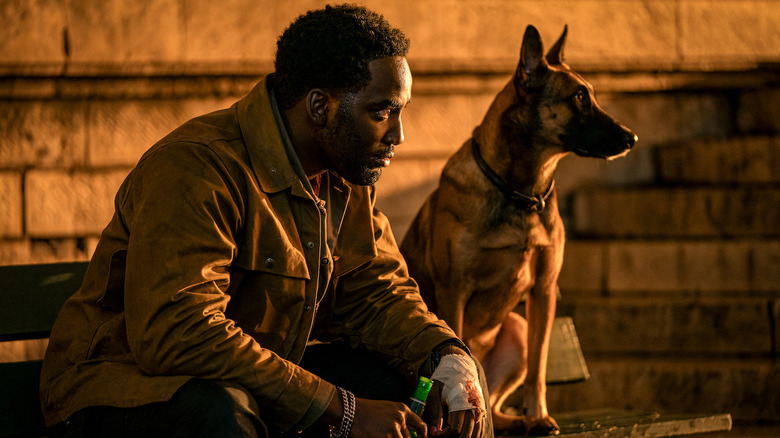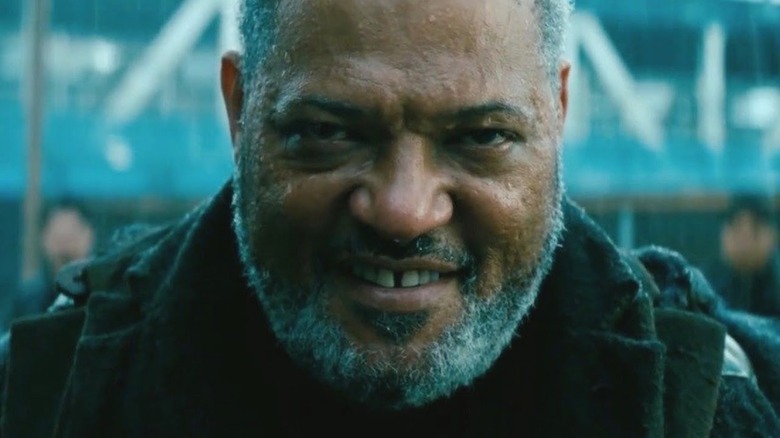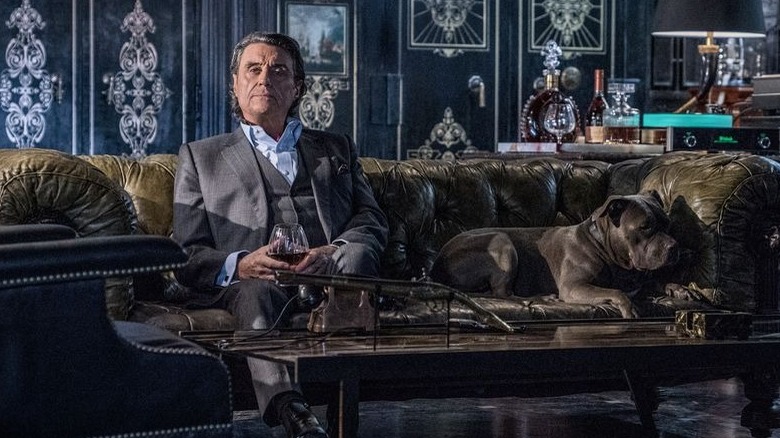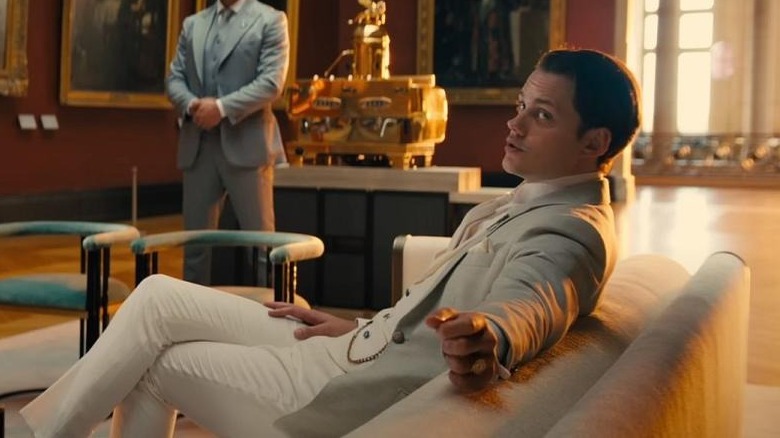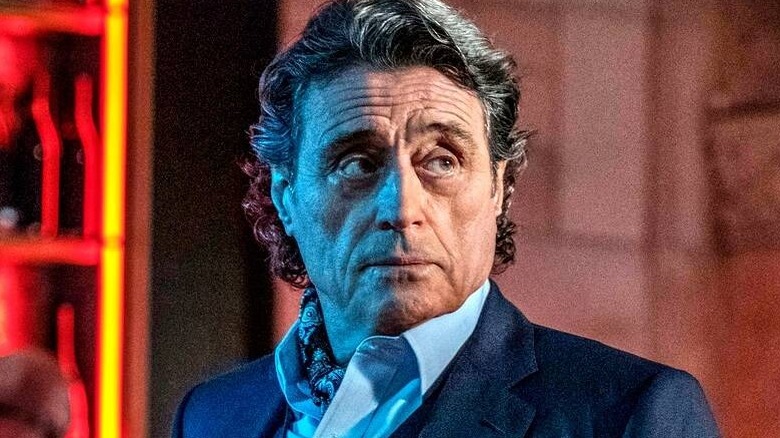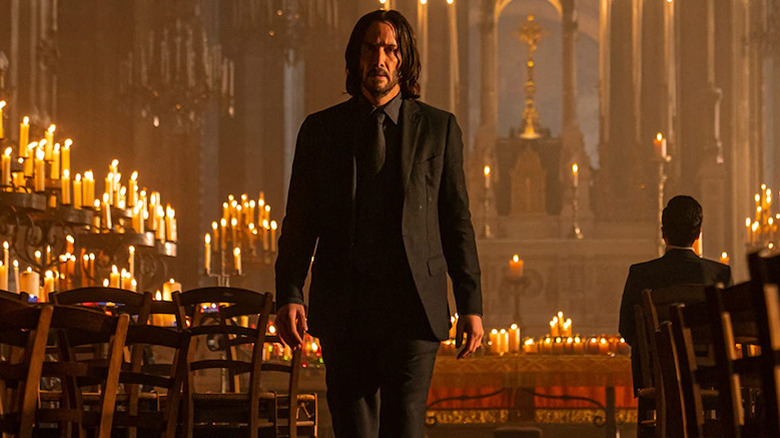The Ending Of John Wick: Chapter 4 Explained
Contains spoilers for "John Wick: Chapter 4"
"John Wick: Chapter 4," directed by stuntman-turned-filmmaker Chad Stahelski, is an over-the-top, violent action-thriller, and the fourth entry in the lucrative "John Wick" franchise. The film stars Keanu Reeves — reprising his role as the eponymous assassin — who is out for revenge after being betrayed and left for dead at the end of the last film, 2019's "John Wick: Chapter 3 – Parabellum." Reeves is joined by series regulars Ian McShane, Lance Reddick (who sadly died at the age of 60 late last week), and former "The Matrix" co-star Lawrence Fishburne, while the film also introduces franchise newcomers Donnie Yen, Hiroyuki Sanada, Scott Atkins, and Bill Skarsgård.
Like the previous "John Wick" films, "John Wick: Chapter 4" is exciting, explosive, and full of excellently-choreographed martial arts sequences — of which Reeves does the majority of the stunts for himself. The action sequences are also amped up, including a fight scene in the middle of Paris traffic, and a continuous shot of Wick using a makeshift rocket launcher. The new characters introduced in this film are a blast, especially Donnie Yen's sympathetic blind assassin Caine and Bill Skarsgård's foppishly aristocratic baddie, Marquis Vincent de Gramont.
But after the credits rolled, there were many things that the ending left us pondering. What do Wick's actions mean for the hierarchy of the assassin underworld? What does Skarsgård's villain symbolically represent? And what does Wick's ultimate fate mean for the franchise?
John Wick finally dies a noble death
As in all the previous "John Wick" films, Keanu Reeves' iconic dog-loving hitman racks up an insane body count throughout "John Wick: Chapter 4." However, unlike the other films, John Wick seemingly doesn't come out this one alive. That's right: John Wick, for all intents and purposes, actually dies at the end of "John Wick: Chapter 4," finally succumbing to the many injuries he accrues throughout the story.
However, the actual final blow to Wick is dealt by blind assassin Caine (Donnie Yen). Wick and Caine end up dueling each other with old, antique guns — Wick to finally escape the High Table's grasp, and Caine to save his daughter (whose survival is dependent on Caine killing Wick).
Luckily for Caine, Wick discovers his moral dilemma. Wick also realizes that his anger is only hurting those around him, and that killing isn't bringing him closer to peace. So Wick decides not to shoot, sacrificing himself so that Caine's daughter can live (and outsmarting the smug villain Marquis Vincent de Gramont, who makes them duel in the first place).
According to an interview with The Hollywood Reporter, director Chad Stahelski says that both he and star Keanu Reeves "are done for the moment. We're going to give John Wick a rest." He goes on to mention that the studio might have other ideas (and judging by the deluge of spin-offs, that seems likely), but also seems to confirm that the death is real and final — at least for now.
Will John Wick's death be a new template for action movie protagonists?
John Wick's death at the end of "John Wick: Chapter 4" is extremely surprising, for a variety of reasons. For one, we've seen him mow through other assassins with ease, as well as routinely falling from great heights, so to see him finally succumb to his injuries is jarring. Not to mention that this effectively means the main "John Wick" franchise is effectively over — besides the upcoming spin-offs "The Continental" and "The Ballerina," both set in the "John Wick" universe — and will either need a reboot or a major retcon to bring back Wick as the lead.
So, beyond the shock of the event itself, what does this mean for long-running film franchises as a whole? Will the death of the series' protagonist be a new trend going forward?
Arguably, this would be great for film. In a Hollywood landscape that covets the constant continuation of franchises and IP, this allows for stories and characters to actually have real closure. There is even precedent, including the death of Iron Man signaling the end of "The Infinity Saga," and recently the death of James Bond at the end of "No Time to Die." Hopefully, more franchises will take this approach going forward. We'll see.
What Wick's death could mean for The Ballerina and The Continental spin-offs
One thing that really set the first "John Wick" film apart from other violent, R-rated action films of the era — beyond its undeniable style and Reeves' committed physical performance — was its extensive and seemingly intricate lore and world-building. Sure, the original "John Wick" only barely sketched out the assassin underworld, but its subsequent sequels greatly expanded on the franchise's universe, making it feel lived-in and consistent.
However, with Wick's death at the end of "John Wick: Chapter 4," it really calls into question what that will mean for the upcoming announced spin-offs from "John Wick." This is especially true for "The Ballerina," which is set to star Ana de Armas as the main character, with Len Wiseman ("Underworld") directing. For one, there's the fact that it's been confirmed that Keanu Reeves filmed what sounds like a fight scene between him de Armas' "Ballerina" character, meaning it's either a prequel or Wick's death was greatly exaggerated. Furthermore, if it is indeed a prequel and Wick is definitely dead, then is this film setting up de Armas as the new face of the franchise?
Unlike "The Ballerina" — which we know very little about at this point — "The Continental" is a show that will be streaming on Peacock about the adventures of a young Winston (played in the original films by Ian McShane), now be portrayed by young actor Colin Woodell. Wick's death, therefore, doesn't seem to impact this show's story. Still, it'll be interesting to see what the franchise looks like going forward.
Caine attacked by Akira, as foreshadowed earlier in the film
At the beginning of "John Wick: Chapter 4," Wick has very few allies and even fewer friends. This is how Caine is able to eventually catch up with John Wick, since he knows that one of the few people that would risk their lives to protect Wick is the manager of the Osaka Continental Hotel, Shimazu Koji (Hiroyuki Sanada). He turns out to be right, as Wick seeks the help of Koji and his beautiful and deadly daughter, Akira (Rina Sawayama).
Unfortunately, Wick and Koji's reunion is cut short by Caine showing up with an army of High Table goons. While Caine doesn't want to fight either Koji or Wick, his daughter's life hangs in the balance. Their bloody shoot-out leads to Akira being shot, forced to watch Caine regretfully kill Koji as he attempts one last time to protect John.
Caine, however, senses Akira's injury, and tells her not to try to fight, as he has no intention of hurting her. He even says he'll be waiting for her revenge. During the post-credits sequence, Akira makes her move to take out Caine once and for all. Unlike John Wick, who by the end learned to let go of the cycle of violence, Caine instead continued to perpetuate it, and must now face the consequences.
Mr. Nobody practices collective bargaining
If "John Wick" is indeed a revolutionary text, with John Wick as a reckoning against the bourgeoisie-coded High Table (its name literally evoking classicism and intense stratification), then a Tracker known only as "Mr. Nobody" (Shamier Anderson) represents someone seeing the error of their ways through John's actions. While John's journey is much more personal, Tracker's is abstract but still pivotal to the class warfare themes of the film.
Throughout the film, Mr. Nobody continually gets the drop on John Wick, but refuses to kill him until the price is high enough. He is essentially employing the Labor Theory of Value, which is defined as "the value of a commodity [is] a product of the labor time it took to produce ... [thus] workers produce value but capitalists control how much of it is returned to them in wages." In this way, the only value is what a worker brings to the table — not the other way around.
However, he is continually lied to, undercut, and mistreated (including getting his hand stabbed by his would-be employer), and realizes that his way of conducting business is bad for his body and soul. He eventually works collectively with other hitmen like Wick and Caine in a way that will benefit them all.
John Wick might've incited revolution within the hitman world
In the "John Wick" series, The High Table is the seemingly omnipresent, infinitely wealthy head of the assassin world. When we are initially introduced to the world of "John Wick" in the first film, the intricate and strange rules that govern this world are just background details and fun but mostly disposable universe-building. The sequels, however, delve much deeper into the lore and mythos behind those aforementioned rules and rituals.
It eventually becomes very clear that the assassin world is governed by The High Table, so powerful they are able to conjure up hundreds of highly-trained assassins at a moment's notice to keep an iron grip on their subjects. Even John Wick had trouble escaping that life — and it eventually caught up with him again anyway. It's also clear that the only thing High Table cares about is maintaining its power. They are willing to threaten the children and loved ones of assassins to keep them in line, as we see happen to Caine.
However, John Wick's defiance of the High Table and its rules — as well as his continual success in doing so — threatens the entire underworld order. At one point, Lawrence Fishburne's The Bowery King even says "viva la revolucion" — a rebellious rallying cry — in support of John Wick's mission to take down the High Order's senior member, the Marquis Vincent de Gramont. Perhaps Wick will even inspire others to do the same.
Things all might stay the same for the most part
There's something very liberating and exciting about seeing John Wick, a lone, solitary figure, find a way to challenge the long-established power governing the film's sprawling underground assassin world. Not only that, but in the film he canonically inspires others such as Shimazu and Mr. Nobody to work against their own interests for the common good: In this case, helping fight back against the powerful High Table organization.
However, there's another, much more cynical take on the film's world, and the more probable conclusion of "John Wick: Chapter 4" after the credits roll. While the "John Wick" films are obviously inspired by action films, spy thrillers, and crime capers, they also arguably have roots in film noir. This means that there's a dark, cynical undercurrent to the "John Wick" films, and it isn't as gleefully goofy as its superhero or "Fast and the Furious" contemporaries. Noir doesn't usually have a happy ending, and often deals with the existential dread of living in inescapable and corrupt systems.
At the end of "John Wick," while Wick saves Caine's daughter and finds some sense of relief and peace, the world itself doesn't seem to have changed much. Winston gets his hotel back, The High Table still exists, and assassins are still lurking in the shadows. Like in the real world, those who are powerful enough will not only get away with anything — no matter how illegal or corrupt — but thrive.
Marquis Vincent de Gramont represents the evils of capitalism
The new big bad of "John Wick: Chapter 4" is the head of the High Table, Marquis Vincent de Gramont, played with contemptible arrogance by Bill Skarsgård. The Marquis is given unlimited resources and carte blanche from the organization to find and kill John Wick, and he sees this as an opportunity to rise up the ranks.
However, if a main focal point of "John Wick: Chapter 4" — and the "John Wick" series in general — is the way in which a corrupt system forces people to do the unthinkable to survive, while those in power remain safe and wealthy and reap the benefits, it's clear that the film is talking about the corrosive nature of capitalism. And if that's the case, then Skarsgård's Marquis is the avatar of bourgeoisie decadence.
Similar to many venture capitalists, he is someone who is a proponent of deregulation, which means breaking rules and traditions — or, at best manipulating and bending them — to get what he wants. He also doesn't do much actual work himself, like many CEOs and prominent business leaders. When Wick challenges him to a duel, he cowardly passes off the job to Caine instead. He also engages in unethical business practices, constantly changing the deal, reneging on his promises, and even physically harming Mr. Nobody while trying to negotiate a contract.
Other spin-offs that could be generated from the John Wick franchise
Considering how "John Wick: Chapter 4" ends, coupled with the expansive nature of the assassin underworld, it's likely that spin-offs and prequels will be the way forward. However, besides the aforementioned Peacock show "The Continental" and the Ana de Armas-led "The Ballerina," nothing else seems to have been announced yet. But what are some other potentially entertaining spin-offs from the "John Wick" universe that could be produced?
Well, one of the most obvious ideas would be a young John Wick show, where we see Wick rise through the ranks as a child orphan trained to be an assassin. This would probably mean no Reeves (except maybe in flashforwards), since it's unlikely they would attempt to use CG to de-age Reeves to his "Bill and Ted's Excellent Adventure" years. Furthermore, it would also allow an opportunity to give a young actor the spotlight.
Another idea would be a spin-off show focusing on the newly rebuilt Continental Hotel in New York City. It could possibly be a sort of anthology-type show, where Ian McShane's Winston acts as a host for guest-starring assassins and their quirky, action-packed adventures. Even if McShane isn't interested — especially since his character is already getting his own streaming show — they could focus this show on a different Continental Hotel altogether.
Possible ways John Wick could've actually survived the end
As previously mentioned, it seems pretty clear that John Wick is dead and buried at this point, at least according to director Chad Stahelski. It would probably be for the best for the character — and franchise — if Wick is allowed to die and move on. It provides emotional catharsis for Wick, as he gets to go out on his own terms as a hero and possibly reunite with his beloved wife Helen in the afterlife (as implied by the snippets we see of her as his life slowly fades away).
However, like the evil Marquis Vincent de Gramont, the greedy capitalistic nature of the film industry won't ever let sleeping dogs lie — not when profits can be made. And while there are spin-offs already in the works, it's unlikely that there aren't studio executives scrambling to find a way to bring Reeves back to the franchise.
But how would that be possible, narratively speaking? One idea is that he and Winston worked together to fake his death, using The Bowery King as a reliable witness at the grave site (who, presumably, wouldn't be in on the scheme). It would be a favor from Winston to John for forgiving his betrayal and giving him the Continental Hotel back. That might be what the penultimate shot of Winston's tattoo is all about: John is family, and Winston will protect him. We didn't see the body being buried, after all.
Another possibility: zombie John Wick.
